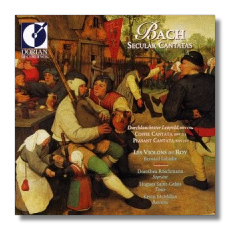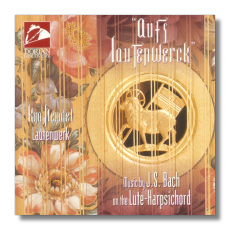
The Internet's Premier Classical Music Source
Related Links
- J.S. Bach Reviews
- Latest Reviews
- More Reviews
-
By Composer
-
Collections
DVD & Blu-ray
Books
Concert Reviews
Articles/Interviews
Software
Audio
Search Amazon
Recommended Links
Site News
 CD Review
CD Review
Johann Sebastian Bach

Secular Cantatas
- Durchlauchtster Leopold, BWV 173a
- Schweigt stille, plaudert nicht, BWV 211 "Coffee Cantata"
- Mer hahn en neue Oberkeet, BWV 212 "Peasant Cantata"
Dorothea Roschmann, soprano
Hugues Saint-Gelais, tenor
Kevin McMillan, baritone
Les Violons du Roy/Bernard Labadie
Dorian DOR-90199 DDD 73:13


Aufs Lautenwerck
- Suite in E Major, BWV 1006a
- Suite in C minor, BWV 997
- Suite in E minor "aufs Lautenwerck", BWV 996
- Fugue in G minor, BWV 1000
- Prélude, Fugue & Allegro in E Flat Major, BWV 998
Kim Heindel, lautenwerk
Dorian Discovery DIS-80126 DDD 57:42
The lautenwerk is the early-Baroque period's attempt to marry the tonal characteristics of the lute with the technical facility of the harpsichord. With one or two manuals, and plucked gut strings arranged in a horizontal plane, it physically resembles the latter instrument. Bach owned two of them, and we can assume that he played them too. He probably never played the lute, however, and yet items 995-1000 and 1006a in the BWV catalog are described as being "for lute." Might not Bach have written these works for lautenwerk instead?
That's the thesis behind this absolutely delightful recording. I'm in no position to assess its musicological merits, but musically it's a great success. The lautenwerk's warm, resonant sound and Heindel's mellow, assured playing argue more convincingly for this approach to these works than mere words ever could. If you've enjoyed this music on the lute or – heaven forbid! – on the guitar, then you should get a whole new thrill out of hearing it played on such an attractive-sounding instrument.
It's an attractive-looking instrument too. No original lautenwerks survive. This one was built in 1992 by Willard Martin (who contributes one of the essays in Dorian Discovery's booklet), and the soundboard was painted by Pam Gladding. The booklet cover lets us enjoy some of her exquisite painting in detail.
There's exquisite painting of another type on the other Dorian disc: Pieter Breughel the Elder's "Peasants Dancing." It's a perfect visual image for Bach's Peasant Cantata, that celebration of good drink, good lovin', and good times. Les Violons du Roy is a hybrid group that plays on modern instruments (except for the strings' period bows) but uses historically-informed performance practice. Of the singers, only soprano Roschmann is an early music specialist, but McMillan and Saint-Gelais both have performed extensively with Les Violons du Roy.
Dorian lists this as the first CD recording of Durchlauchtster Leopold. It's an early work, and it was later reworked in BWV 173, which we know as the Whit Monday cantata Erhöhtes Fleisch und Blut. BWV173a is two movements longer and uses only two voices (the reworking uses four). Compact and written to display the brilliance of the singers' voices, it is a worthwhile addition to the Bach discography.
The performances on this disc are enjoyable and polished, although I wish that the singers had let their hair down more in the Peasant Cantata and been less genteel. McMillan has some pitch problems too. Les Violons du Roy could hardly be bettered, though, and the sound is excellent (as it is on the Heindel disc). This disc was recorded in the Church of Saint-Isidore, Quebec in January, 1994. It must have been cold and snowy outside, but the warmth of the music inside probably made it easy to forget the weather.
Copyright © 1996, Raymond Tuttle


















